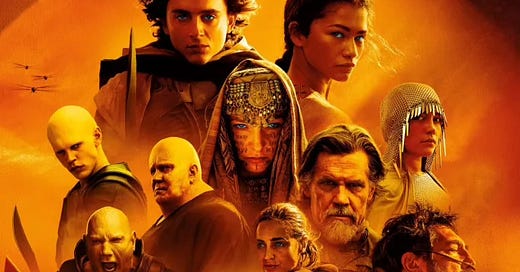Dune & The Hopelessness of Weaponized Grief
Dune: Part Two releases nationwide this weekend. I was among the lucky ones to see the fan preview a week ahead of time. Dune: Part Two is a cinematic triumph. At the time of this writing, both critics and fans have heralded the film and given it a 97% rating on Rotten Tomatoes. Of course, only the most interested fans made their way to the theatre on a Sunday night. There’s a significant segment of the population — including my wife — who look at Dune and only see sand.
So, what makes the Dune book, and all the movies which have followed over the years interesting to so many others? A few things. There are folks who like Sci-Fi. There are others who like fantasy (and Dune, I argue, has both). Readers and viewers have always enjoyed epic landscapes and large scale battles, complete with political intrigue, and a measure of the mystical and spiritual. Lord of the Rings, Harry Potter, Game of Thrones and many more have proven the power of this kind of storytelling.
Yet, hiding under the sands of Dune: Part Two, is a meditation on grief.
As a communicator, I know at least two things. The first is that all communicators communicate through the lens of their pain — our lifelong pain, our bloodletting, our history and trauma. The second, that we communicate in real time — where we are, what we are experiencing at that moment. All to say, what I see under the surface is Paul Atreides’ struggle to manage his grief.




